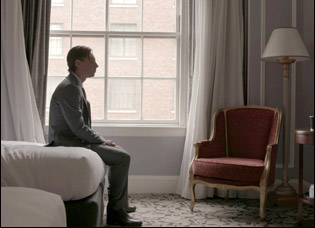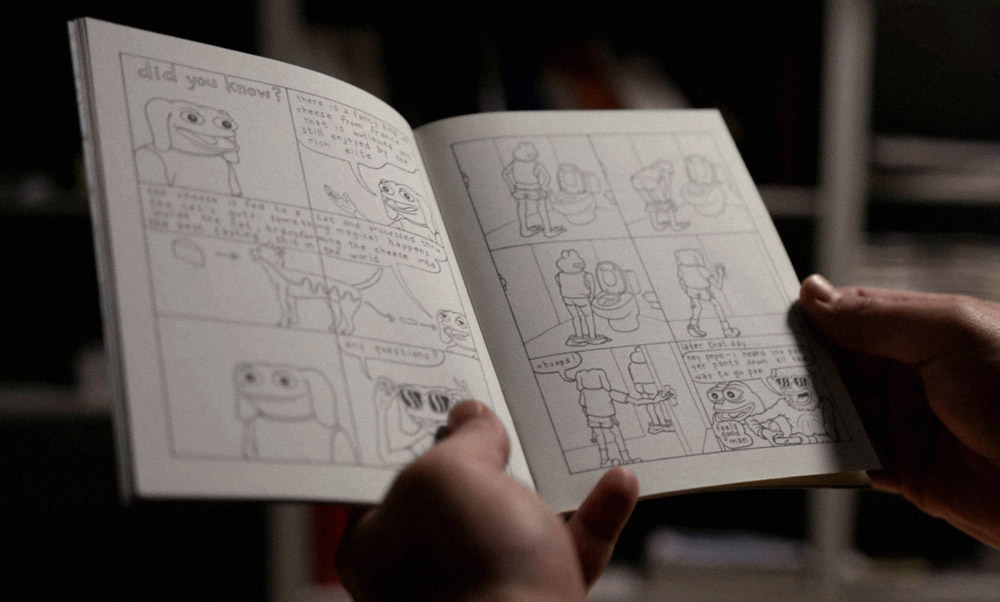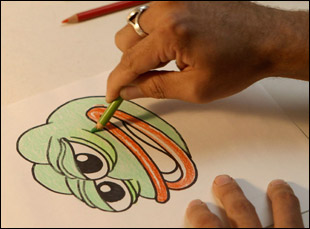If there is one definitively accurate interpretation of Pepe the Frog, the Internet meme that has become a symbol for any number of groups, it is that it undoubtedly the id of its laid-back creator Matt Furie, an artist who yearns for the days when he could just draw without worrying what the perception of his work might be. Instead, when Pepe is co-opted most prominently as a symbol of the alt right – its sad appearance appealing to those who have felt as if the world’s left them behind and embraced by libertarians for doing as it pleases, Furie is required to take notice, but he’s hardly the only one who needs to go by “Feels Good Man,” a wildly entertaining and sobering account of how the underground icon infiltrated the mainstream.
Tracing how Pepe memes that originated on 4chan boards starting making their way into the tweets of Katy Perry and Donald Trump, Arthur Jones and Giorgio Angelini find an artful way to reclaim Pepe for its creator, observing the ways in which the ambiguous amphibian not only could be projected upon for any number of emotions, but how effectively it could be used in connecting individuals with beliefs they’d rather not air out in public, emboldening one another with the knowledge that there are others out there signaling out to them. For a story that takes place largely on computer screens, Jones and Angelini make it leap off of them, drawing on Jones’ skill as an animator and Angelini’s background in music and documentary filmmaking (last directing “Owned,” about the division of America created by the affordability of housing), to give shape to an issue that exists largely in the abstract virtual space and show its often terrifying real world consequences, never losing sight of Furie’s original intention for Pepe to entertain as part of his comic “Boy’s Club.”
Following the film’s premiere earlier this year at the Sundance Film Festival where it was honored with a U.S. Documentary Special Jury Award for Jones as an Emerging Filmmaker, “Feels Good Man” is arriving in virtual cinemas this week and the director and the film’s producer Angelini spoke about wrapping their arms around such an unexpectedly sprawling story with someone as surprised by its many twists and turns at its center as the audience, in addition to making a distinctive nonfiction film that could honor the origins of Pepe and being able to fuse the processes of recording interviews and creating animation together into one cohesive whole.
Arthur Jones: I was a fan of Matt Furie’s comic books and when I moved to Los Angeles, I met him on a group hike with some friends. I found him to be just a sweet and generous, funny guy and Matt and I talked about maybe doing a couple artistic collaborations together, maybe making an animated cartoon together, but as we were working on those sort of collaborations, it became very clear that all the negative baggage around Matt’s artwork and Pepe was making it hard for us to potentially sell an idea to a network or something like that. So I had pitched Matt on the idea of doing a documentary.
As I was starting the process of making “Feels Good Man,” interviewing Matt, his friends and family, I was doing the post-production animation on another film “Owned: The Tale of Two Americas,” and Giorgio was the director. We were having all these great conversations just about the state of affairs in America, politics, filmmaking — I came to this through graphic design and animation and Giorgio came to filmmaking through architecture and music, so we’ve always had a real sense of the things that we make existing within the culture that we live in. We think about art being a holistic expression of our human experience and the society that we’re part of, so we were [having these] really just these expansive conversations about what was going on, both in terms of our personal process of what was going on in America.
Giorgio Angelini: Yeah, both of us being really big fans of documentary film, I think we saw this story as a particularly advantageous moment to make a documentary, but in a way that could perhaps push the medium of documentary film forward, irrespective of the subject itself. How are we going to put it together? The way we were going to clash different media types together? And yeah, that was part of the real excitement at the beginning of how we were talking about what the film could be was as an art project, just what it could look and feel like.
Because animation often takes a long time often – when it’s so responsive to the interviews you were doing, was it a challenge to develop those processes together?
Arthur Jones: Yeah, most documentary films don’t have this other layer to them, and initially, we thought the animation was going to have its own narrative trajectory, basically its own plot. But as we started to do the interviews and edited things together, we realized the animation really had to sit there and emphasize the things that were happening in the documentary. It couldn’t go off on its own because it was just going to make the film too confusing. Animation does take a long time, but we really completed this animation very quickly before Sundance — we got in with the animatics and storyboards and we had to finish the animation in a period of just a few months, so we relied on three pretty amazing animators — Nicole Stafford, Khylin Woodrow and Jenna Caravello — to come in and help us animate the Boys Club comics that Matt had made.
That was something [where] Giorgio and I would sort of cut a section and then the two of us would be like, “Oh, maybe we could put a little animated sequence there. I would thumbnail in some boards. Maybe we would kick it over to Matt Furie and he would thumbnail some stuff and it was really trial and error. But from the beginning, we felt animation was something we could really add to the film and make it an idiosyncratic documentary that would look different from other films, that would have its own feel and that would also really bring Matt Furie’s artistic world to life.
Giorgio Angelini: Yeah, we wanted the audience to feel Pepe’s struggle [because] as a cartoon character because that’s what he has. He’s arguably one of the top five most beloved cartoon characters in the world right now. He just happens not to be owned by Disney or Nickelodeon or anything.
Arthur Jones: Yeah, there’s a lot of cartoon characters that have been taken by the internet and used for purposes that the original creators didn’t want, but most of those cartoons, you’re aware of that cartoon’s backstory. If you see a meme version of Spongebob Squarepants, you’re aware that Spongebob is a cartoon, it’s owned by a corporation, and you understand that the offensive meme of Spongebob is from something else. With Pepe, people didn’t know the backstory. They didn’t know the comic books, they didn’t know he had four friends that he lived with [in “Boys Club”] and he was this sweet, good-natured character, so we wanted all that to feel real and alive for the audience.

Arthur Jones: That was always our hope. Matt is a very low-key person and we felt from the beginning in order to make this film successful, the audience had to feel as though the reality they were living in was stolen from them the same way Pepe was stolen from Matt. We wanted him to be a stand-in for the viewer and as they were watching the film, to feel like they were learning things for themselves. We didn’t want [it to feel like] a journalist downloading information and then regurgitating it. We wanted the film to feel active, so within the film, we left certain things open to interpretation and wanted an experience where you as the viewer was leaning in and the ideas that are occurring to you as you’re watching the film are ricocheting against each other and maybe you would come to some different conclusions by the end.
Giorgio Angelini: It was definitely a central concern of ours, but also just Matt getting off the couch metaphorically speaking to handle his shit — to understand this isn’t going away — is something that I think speaks to all of us right now, and to understand in order to make change, you have to be that change yourself. Whether or not Matt is successful is something that people debate all the time. On certain corners of the Internet, there’s always, “You’ll never take Pepe back! He’s ours.” But the more important thing is just doing the work and getting up off the couch and taking some agency back because it’s a very unique experience that Matt went through, but I would hope it speaks to a larger audience.
How did the idea of magic come into the film?
Arthur Jones: Meme magic is something that was talked a lot about on 4chan and in culture as people were trying to wrestle with how Trump won, though maybe people didn’t give it a lot of cultural legitimacy. But we felt like it was a conversation to include in the film because we would ask every single person in the filmmaking process, like “Why Pepe? Why this stoned cartoon frog? What made Pepe this malleable symbol?” No one could really answer that question, so we really had to turn to an occultist to put it all into perspective.
In the essay that John Michael Greer initially wrote about Pepe, he calls magic the “politics of the unheard,” so whether you would agree that the people on 4chan are unheard or not, they feel as though they’re unheard and people were making a self-conscious effort of using Pepe and giving him this special outsized power. John Michael Greer talks about Pepe as an omen and that’s a takeaway of this film is that Pepe is an omen and that omen can mean different things to different people for different reasons.
Giorgio Angelini: And certainly the important piece of context to it is when Arthur’s mentioning about 4chan that their perception is they are the unheard, Pepe does operate at this emotional veil similarly across the world where he is this symbol of youth that feels unheard and he becomes the icon of that struggle that manifests in different ways [globally]. When you watch the film, without spoiling the ending, I think you’ll see how broad that coalition is.
Arthur Jones: And John Michael Greer was a really special interview. That was something we shot late at night in a library that Edgar Allen Poe had written some of his poems in and that interview had its own energy to it. Most of our interviews would go on for several hours and that was maybe a half-hour long and everything he said had its own energy to it and Giorgio and I were both looking at each other that entire shoot and going, “This is kind of incredible.” We had also done that right after we had talked to Matthew Braynard, the Trump surrogate in the film, so we really felt like between those two interviews, those really gave us the film.
Giorgio Angelini: Also, it just looked incredible. It was just the moment in the film where I just felt like we got this. I always knew it was going to be good, but I felt this is what really had the potential to make it feel special.

Giorgio Angelini: This kind of ties into John Michael Greer because after learning more about meme magic, I was like, almost as a joke, I was like I’m going to write a song because there’s this running joke in the industry that the easiest way to get an Oscar is to write Best Original Song. [laughs] That’s the best chance, statistically speaking. And most of my experience creatively is in songwriting, so [I thought] “Fuck it. I’ll write the closing credit track,” but I knew I did not have the clout for that, so I reached out to several friends and friends of friends and somehow managed to convince Sharon Von Etten to co-write the song with me and my partner Mike Semple. But it was very strange. It was the only time in my life I’ve ever recorded virtually with a collaborator because it was the depths of COVID crisis, but it came out beautifully. [Sharon] sent us melodies and lyrical content – she was such an incredible collaborator, but I still haven’t met her in person yet. [laughs] But we’re going to meme magic that thing into an Oscar nom.
I know of at least one director who said he writes a song for every movie because the royalties are better than for any other part of the process.
Arthur Jones: Yeah, this is all an elaborate long con for Giorgio. [laughs]
You were able to screen the film a few times before the orders became to stay inside and I understand the True/False screening was really special for you. What’s it been like bringing this out into the world?
Arthur Jones: True/False was very special to me because I grew up very close to where the True/False Film Festival is and it’s specifically dedicated to documentary film and most of the people who attend it are really passionate fans about documentary film and you really get a chance to interact with the filmmakers and see amazing films that you’re not necessarily going to see on a streaming service. We had a screening at True/False where we had 1500 people come to it and there’s an hour-long Q & A afterwards and Missouri’s a very divided part of the country [politically], and the documentary filmgoing crowd is a slightly older crowd at these festivals, but there was a younger contingent in the crowd who had come because they knew the story was about Pepe and this was like a youth culture film for them, so we got a chance to see the movie really play differently to two different audiences.
This was a story that the older typical doc-going crowd knew nothing about and you could see the veil getting lifted like people going, “What? I had no idea.” And then [for the younger generation], it felt like more of a documentary about punk rock because these kids that are online, even if you’re not a member of the extremely online alt right, Pepe is something that you’ve seen on all the different platforms – gaming platforms, Tumblr, any kind of social media, so it was a story they were more engaged with emotionally, and it was a really fascinating experience to see this really little movie that we made in this tiny room, edited on laptops, on a huge screen with a big audience. Certainly, it was very emotional, but then also having the audience really engage with the film in a very earnest and thought-provoking way was really special.
Giorgio Angelini: It’s also your home.
Arthur Jones: It is my home, and my parents came. My dad gave it a solid B+, which was cool. [laughs] I was like, “Thanks, Dad.”
“Feels Good Man” will be available on September 4th on Apple TV, Vimeo on Demand and Fandango Now. It will also be in select Alamo Drafthouse theaters. A full list is here. It airs on PBS’ Independent Lens on October 19th.





